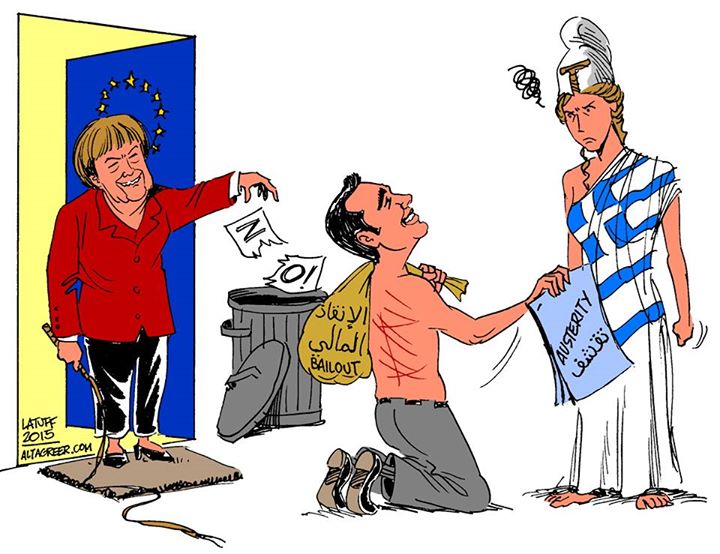There are two things that remained quite constant since the onset of the ‘euro-zone crisis’ and the ‘Greek tragedy’ starting in 2010. One is the ever harder pressure from Greece’s creditors (EU-Institutions, IMF) for austerity and neo-liberal ‘structural reforms’. The other is the opposition to those demands by various social movements, and in particular the social-democratic official trade unions (GSEE and their affiliates) and the more radical ‘communist’ cross-sectored PAME trade unionist movement in Greece.
They mobilised against those Troika diktats regardless whether Social Democrats (PASOK), Conservatives (Nea Dimokratia) or the ‘radical left’ SYRIZA headed the respective Greek governments, all of them executing austerity policies imposed on the Greek people by the creditors and accepting that the country thus was reduced to a semi-colonial status.
The latter forces again organised general strikes and protests of hundreds of thousands against the latest ‘reform package’ of the current Tsipras SYRIZA-led government. Despite the recent wave of protests, new austerity measures were adopted by the Greek Parliament on 18 May 2017 in an effort to secure the release of a €7.5 billion bailout tranche from the creditors within the framework of the 2nd review of the 3rd Memorandum of Understanding (MoU), accepted by Tsipras in 2015. Athens wants those credits to repay debt maturing in July 2017. Further ‘reviews’ (implicating new demands by the creditors, if in their view Greece did not sufficiently reach the agreed targets) are to be expected possibly up to 2021.
The 2nd Review in a nutshell
Already on 2 May 2017 the European Commission, the ECB, the ESM and the IMF announced to have come to an agreement with Tsipras’ Greek government on the content and financial implications of the next ‘reforms package’: a new round of pension cuts, privatisations, tax hikes and further labour market deregulation. As regards new liberalisation measures, it is not only about ‘opening up the energy sector to more competition’, but privatizing state owned coal plants, the Public Power Corporation, Hellenic Petroleum, Greek Gas Company-DEPA etc. and other public utilities – as had been done with e.g. regional airports (sold to German Fraport), the port of Thessaloniki (sold to a German investment group) etc. For a short and crisp overview on the recent package, see the contribution by Nikos Chountis MEP (GUE/NGL) here on this blog.
The political forces of the ‘radical left’ in Europe once (from the 1990ies onwards) were very united in their opposition to EU or national austerity policies and neo-liberal structural reforms. Currently, this doesn’t seem to be the case any more.
The ‘radical left’ in Europe and the ‘Greek Tragedy’
As regards Greece, the European Left was in state of euphoria after 2012 with the electoral rise of SYRIZA: Greece will become the spark to end austerity in Europe. It spun a narrative that Spain, Portugal, Ireland etc. would follow, building an European anti-austerity alliance, which would be strong enough to draw the governments of France (Hollande), Italy (Renzi), Social Democrats and Greens on their side. At that time, there was only an emerging debate amongst smaller circles of leftists academics (e.g. left economists such as Michel Husson and Özlem Onaran vs. Costas Lapavitsas and others from the Research on Money and Finance network) about the constraints of the euro-regime on any potential ‘progressive government’ emerging at the EU periphery wanting to implement its programme against a strictly austerity-oriented EU and German economic dominance. Lapavitsas argued that a break from the euro-zone would be necessary to do that, Husson et. al argued that the euro-issue was not that important and the return to national currencies would be dangerous.
With the capitulation of the SYRIZA led government in 2015 and Tsipra’s acceptance of the 3rd Memorandum, disenchantment on the left set in – as its ‘domino theory’ of a ‘left turn in Europe’ also didn’t materialize. This is well known to the readers of this blog. So I do not go into the details of those discussions (only reminding of Perry Anderson’s ‘The Greek Debacle’). The former mainly academic debate about left strategy in Europe broadened and diversified – Plan A, Plan B, Plan C etc..
As regards their views on the formerly so much hyped SYRIZA as a model party for the European radical left, opinions also diversified. Some openly criticized Tsipras and SYRIZA (e.g. the French Left Party), others chose to refrain from public comments (e.g. IU and Podemos in Spain, the Left Bloc in Portugal), and others claimed that SYRIZA now would need more solidarity from the Left than ever (e.g. DIE LINKE and Rifondazione Communista).
Germany‘s DIE LINKE and SYRIZA
The narrative developed by DIE LINKE co-chairs Bernd Riexinger and Katja Kipping on this is very illuminating for the views of the latter group. The European radical left was not strong enough to organise sufficient EU-wide solidarity for the SYRIZA government; with this unfavourable relationship of forces against Greece, Tsipras could not do otherwise than bow to the demands of the Troika. At least, his government does everything to counterbalance EU-imposed austerity by social measures for the most vulnerable sections of Greek society (e.g. free school meals, free public transport etc. for the poorest). If Greece would exit the euro-zone, things would be much worse.
However, already this tale spreads the notion that ‘there is no alternative’ (TINA), at least as long as e.g. there is no upturn of class struggles all over Europe and a Red-Red-Green constellation (R2G) in Germany in place that would offer a profound reform of the EU and an end to austerity. So long, it seems, the Greek people unfortunately will have to wait and suffer on …
There is also a current in DIE LINKE around economists such as Joachim Bischoff (editor of the monthly magazine Sozialismus) and Axel Troost MP (of the German group Alternative Wirtschaftspolitik – Memorandum), seeing themselves at the parties ‘centre’ position. They claim that the left in Europe should show more ‘political maturity’ by recognizing that Tsipras already achieved a softening of austerity and gained more leverage for stimulating economic growth. Greece is considered to be on track for economic recovery due to its ‘intelligent management’ of EU funding and soon might be able to quit the Memorandum of Understanding and regain access to financial markets and the ECB’s ‘Quantitative Easing’ Programme. See a list of links to respective contributions (in German) at the end of this article.
However, their hopeful analyses so far did not materialize. For a critique of such wishful thinking, see e.g. economist Paul Steinhardt here and here; and a piece by Günther Grunert and Walter Tobergte here (in German).
R2G at the European Parliament and Greece
All that told, what could be expected from forces favouring a German-style R2G perspective with a view to ending austerity in Greece? On 17 May 2017, the Presidents of the S&D group (Gianni Pitella), the Greens (Ska Keller) and the leftist GUE/NGL (Gabi Zimmer) in the European Parliament launched a common statement to address the Eurozone finance minister’s meeting scheduled for 22 May. The Euro group vaguely had announced that with the 2nd review closed so far on the ‘reforms package’, it would begin discussions about some debt relief for Greece (see also Lexit’s Digest No. 11 on this website for more). Eventually, that meeting ended without any agreement.
The narrative of the R2G-Alliance in the European Parliament on Greece is simple: The Greek government delivered on the creditor’s demands on the 2nd review, differences between the IMF and the European creditors and the austerity measures have been proven counter-productive, now it is on the Euro group to deliver something on debt relief in return. However, the three Presidents also admonish their mutual friend Alexis Tsipras: “Stepping up competition policy to break up oligopolies in the interest of fair markets should remain priorities in order to bring the Greek economy on a sustainable path of recovery.” In the light of the liberalisation and privatisation measures demanded by the creditors and agreed by the SYRIZA-led government, this is R2G at its best: supporting the creditors on that front of implementing structural reforms further on to reinforce ‘competition’.
As regards Social Democrats and Greens, this is not surprising. They always argued for a ‘balanced’ approach combining ‘fiscal consolidation’ and growth enhancing measures, including ‘structural reforms’. It also might be remembered that then-time EP President and now candidate for chancellor of the SPD Martin Schulz campaigned against the OXI in the Greek referendum in 2015 and together with Sigmar Gabriel positioned himself to the right of Schäuble and Merkel when OXI won. To expect from Social Democrats and Greens any meaningful solidarity with protesting Greek pensioners, trade unions etc. is futile, given their historical record on the ‘Greek Tragedy’. They only shed some crocodile tears on the immiseration of the Greek people. With the ‘radical left’ in Europe, it once had been different.
For the politically heterogeneous GUE/NGL group, opposition to austerity, liberalisation, privatisation and neo-liberal structural reforms was the emblematic sealant that kept these formations of the ‘radical left’ together. With that common statement, the GUE/NGL’s political profile as an anti-austerity and anti-neo-liberal force is damaged. That is the price to be paid to become a ‘mature and responsible’ junior-partner in a R2G constellation (even if only as a ‘coalition in the opposition’).
How could this happen? The usual procedure with all other groups in the European Parliament when signing common declarations is that at least the respective group’s leadership bodies are consulted on the texts and give a green light. In the case of the ‘common statement’ it is claimed that the GUE/NGL’s executive body was not consulted. Be this as it may – this poses some serious questions about the internal workings of that group in general and on its democratic decision making in particular. How to remedy the damage done, which consequences are to be drawn from that event? We shall see how this will be answered by the ‘radical left’ forces in the European Parliament.











